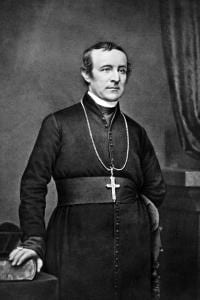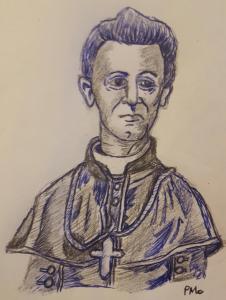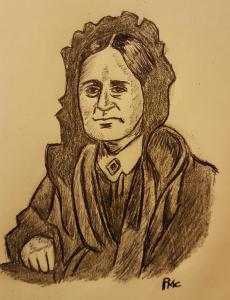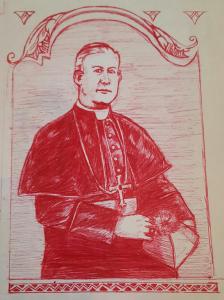![catholicchurches00shea_0730[1]](https://wp-media.patheos.com/blogs/sites/224/2013/06/catholicchurches00shea_07301-172x300.jpg)
” Unless the Lord build the house, they labor in vain that build it.”
These words of the holy prophet, beloved brethren, said the Most Rev. Archbishop, are presented to us in her offices by the Church whenever we undertake any thing like the great work, the commencement of which has brought you together this day. The prophet speaks of “the house,” but the Church understands it emphatically of the House of God, which is not every house, but a special house set apart, and to be consecrated to His worship and His glory ; and hence, if, in any undertaking, these words would be appropriate on the hearts and on the lips of a Christian, they are more particularly so when we venture to raise a structure to the honor of the great God who created this magnificent universe out of nothing.
We employ them on this occasion, as upon many others, to signify that all the merit which man can have is the merit of his good intentions, of his high and noble will ; not indeed (for that would be extreme arrogance and impiety) as if he could add any thing to the majesty and glory of God, but he can add indirectly by recognizing that glory, and, as far as it is within his means, by manifesting even in an outward way his reverence for God, who, though unseen, is everywhere, but more especially on the altar of the Holy Catholic temple. When God created the heavens and the earth there was no sin ; but sin was afterwards committed by His permission—that is to say, by His not having prevented it— having left, man at liberty to render Him a homage that would be a free homage. In consequence of the sin committed by our first parents, we have entailed upon us all the trials, and sufferings, and disappointments, and sickness, which we experience in life, and finally death itself. This was the work of the first Adam.
The second Adam—that is, our Saviour Jesus Christ—introduced the resurrection. By the first Adam there we were as entailed upon the earth as well as upon its inhabitants a general malediction. The words of the Almighty were, that the earth itself was cursed; and that malediction has not been removed, because the consequences of original sin still prevail. Man, thou art but dust, and unto dust thou must return; and the admonition of the precept was, that on the day that the free, but innocent, and pure, and holy creatures which had just come from the creating hand of God should fall, they should die. We all know what death is; and although the Son of God became man, and died for us, it was not to redeem us from the temporal penalty of sin, so much as to redeem us from that eternal death which would have been otherwise the consequence of human transgression.
It is for this reason that whenever the Church authorizes a portion of the earth to be taken and set apart from profane and secular uses to be the ground and the foundation of an altar to His glory, through the merits and by the authority of that same Jesus Christ, the malediction that adheres to the earth in general is removed ; and this is the object of the ceremony of prayers and benediction connected with the laying of the corner-stone of a new church. It has been my own happy privilege during the period of my episcopal life, to have officiated in laying the corner-stones of many temples to God ; and as it is to-day your consolation, and joy, and pride, so it is to me a source of great gratification to assist again in that sublime office.
The place on which you stand, as you know, is the centre of a district that is as yet but sparsely populated, but which promises ere long to be densely peopled. There was no sanctuary near this place, no altar, no sacrifice, but there soon will be; and you need not to be told of the advantages that will result not only to the Catholics of this neighborhood, but to the whole population, for in every Catholic church there is a fullness of all that is in the universal Church ; there is its authority recognized and sustained ; there is the power of its episcopacy, and the especial power of its priesthood to consecrate the Victim of the New Law in the Holy Sacrifice of the Christian church. This is the highest worship man can offer to God, because every merit comes through His incarnate Son; every prayer of ours that reaches the ears of the Eternal, must be sanctioned by the merit of our divine Redeemer.
But if prayers receive that benediction through His incarnation, how much more should we receive through the adorable Sacrifice which He instituted—in which He Himself is a priest forever according to the order of Melchisedeck, and in which you blend your prayers with the priest who ministers in the name of Christ. And this is what we are to have here. The edifice which is now in course of erection, may not be the church which is to occupy this ground hereafter, but is to be here for a long period, to serve the poor members of the mystical body of Christ in this neighborhood.
From this place the poor people will derive consolations in all the trials of life; their children will be consecrated to God at the font of Baptism; their youth, at a mature and proper age, will be united in the Sacrament of Holy Matrimony; their sick will be visited in this place; and when they or others shall find their consciences burdened with sin, and will come and confess, God, through the ministry of His priests, will remove the burden, and let them go forth with a light heart; not with the liberty of transgressing again, but with the holy intention of never more offending God. Here, too, they will come to be united with the Head of the Church in the adorable sacrament of the Holy Communion; and when sickness shall have overtaken them they will derive from here the consolation of the last rites of the Church of which the Apostle speaks.” Is any one sick among you, let him bring the priests of the Church, and let them pray over him, anointing him with oil in the name of the Lord, and the prayer of faith shall save the sick man, and the Lord shall raise him up, and if he be in sins, they shall be forgiven him.”
These are the consolations and the ground of our holy religion, and if it were possible for all men to meet in one temple, the recognition of those efforts by which we erect temples to God would not be necessary; but the people of God are scattered from the rising to the setting of the sun, and where their wants require it, let a new corner-stone, and another and another be laid, till ample provision shall have been made for the whole people of God, so that none shall perish for lack of the bread of life. This church is to be superintended by clergymen who devote themselves voluntarily to the work of God; not merely by attending to the spiritual wants of their own neighborhood, but as occasion may offer and opportunities may be multiplied, to carry the word of life to distant regions, with the approbation of the Bishop and their Sovereign Pontiff.
Of course, beloved brethren, this is not a time for me to deliver a discourse upon the Catholic religion, but it is a time for me to say that were it not that the minds of men were preoccupied with false opinions regarding the religion of the Way of the Cross, they would be open to the light of truth in a country free and untrammelled as this is. Now, those false opinions and prejudices are to be struggled with. We have no means—no charm to remove them; at the same time it is the duty of God’s missionaries to present the truth wherever an opportunity is presented, for we know our divine Lord established but one Faith, one Church, one Baptism. We know that the characteristics of the Church belong exclusively to that great spiritual communion of which the successor of St. Peter is the visible head. No man can fix the period of its beginning after Christ, or say from what community it separated.
There have been separations; but this Church remains in the same ground as the tree of eternal life, planted by the hand of our divine Lord, instead of the tree of perdition by which our first parents fell, and by which we became degenerate by inheritance. I will therefore conclude by exhorting you to aid in a liberal and enlarged spirit of Christian faith and charity in this noble undertaking, not merely to- day, but whenever the opportunity occurs ; because it is by the small but numerous contributions of faithful men and women in a country like ours, that we can succeed in laying the foundation of a church, and erecting an altar to the glory of the living God.
Lawrence Kehoe, ed., Complete Works of the Most Rev. John Hughes, Archbishop of New York (Volume 2) (New York: Catholic Publication House, 1864), 284-286.











